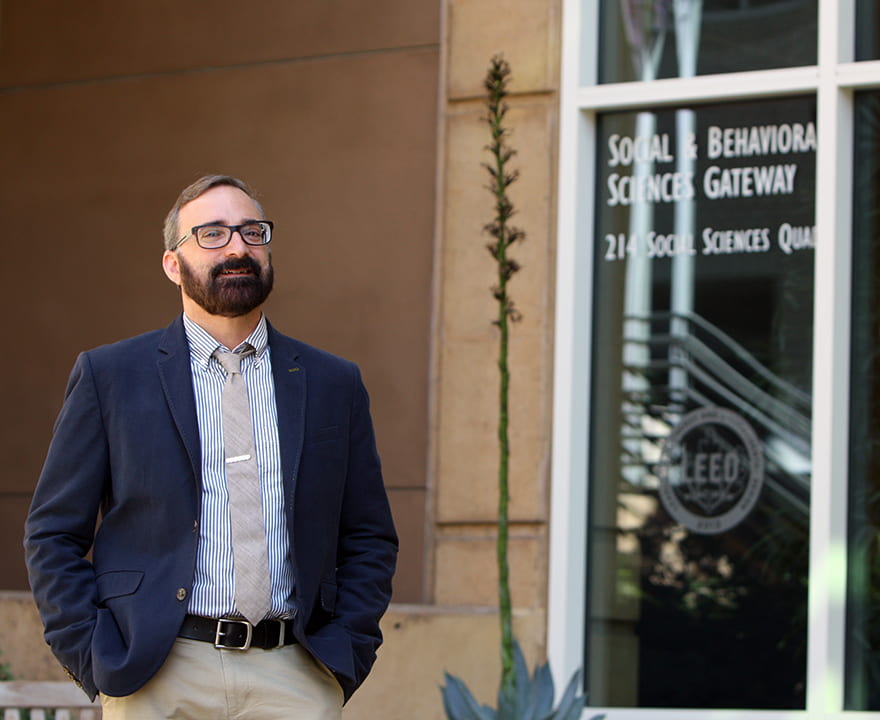UCI awarded $1 million from Templeton Foundation for Anteater Virtues program
Grant will expand campuswide curriculum promoting intellectual character growth

Irvine Calif., July 19, 2022 — The University of California, Irvine has received a $1 million grant from the John Templeton Foundation to expand its Anteater Virtues project, which promotes intellectual character traits that help students develop into more inquisitive, open-minded and authentic individuals.
UCI is the only research university in the U.S. to systematically embed curiosity, integrity, humility and tenacity into the heart of its curriculum.
The brainchild of Duncan Pritchard, Distinguished Professor of philosophy at UCI and principal investigator on the grant, Anteater Virtues is a series of interdisciplinary, faculty-led modules focused on character growth through the study of these qualities. Pritchard launched the project as a pilot in 2019 with support from UCI’s Division of Teaching Excellence and Innovation, and now the modules are integrated into the campus’s undergraduate orientation and curriculum.
“I am thrilled to see Anteater Virtues gain this support from the Templeton Foundation,” said Michael Dennin, dean of UCI’s Division of Undergraduate Education and vice provost for teaching and learning, who was an early supporter of the program. “With the growth this funding enables, I expect to see more students positively impacted by this one-of-a-kind curriculum.”
The grant enables Pritchard and co-principal investigators Richard Arum, UCI professor of education and sociology and former dean of the School of Education, and Jason Baehr, professor of philosophy at Loyola Marymount University, to expand on the series of modules and further evaluate its impact on undergraduate student success.
“Intellectual virtues promote ways of thinking, reasoning and seeking the truth. Learning intellectual humility, for example, can enhance open-mindedness and respect for other people’s opinions, whereas intellectual tenacity can improve students’ willingness to overcome intellectual obstacles,” Pritchard said. These skills are essential not only for academic pursuits, but also for navigating a daily life that’s increasingly online and often laced with misinformation and manipulation, he added.
Pritchard, with a team of UCI researchers, will refine the existing curriculum and develop new and advanced modules, such as the suggested “Dealing With Misinformation in the Information Age,” which will offer interdisciplinary perspectives on how to discern and respond to misinformation like deep-fake videos and disinformation campaigns online. A proposed series of capstone modules will pair specific disciplines, such as nursing and engineering, with the virtues. The goal is to empower students to put what they’ve learned about the intellectual traits into action by addressing specific questions that arise in their chosen field of study.
Arum will lead the evaluation of the program. Building on the Mellon Foundation-funded Next Generation Undergraduate Success Measurement Project, on which Arum is principal investigator, a group will gauge the effectiveness of Anteater Virtues through a randomized control trial testing the usefulness of the intervention as well as monitoring long-term effects associated with the curriculum.
“It’s imperative to couple exciting pedagogical innovations, such as Anteater Virtues, with ongoing rigorous research to track educational efficacy,” Arum said.
Already, Anteater Virtues has shown promising results. A recent educational study found that students who took the modules demonstrated greater intellectual growth than their peers, with this positive effect stable across all the main demographic groupings.
Pritchard, Arum and Baehr hope the expanded series will elevate this success and impact a larger population of students.
“The new modules will enable UCI students to progress through Anteater Virtues at the same time that they progress through their degree, bringing what they’ve learned about virtuous intellectual character to bear on topics in the discipline of their major,” Pritchard said. “We hope that the more extensive educational study that this funding facilitates will further demonstrate the pedagogical effectiveness of bringing the intellectual virtues into the heart of higher education and thereby encourage other universities to introduce similar programs.”
The next phase of Anteater Virtues will launch this fall.
About UCI’s Brilliant Future campaign: Publicly launched on Oct. 4, 2019, the Brilliant Future campaign aims to raise awareness and support for UCI. By engaging 75,000 alumni and garnering $2 billion in philanthropic investment, UCI seeks to reach new heights of excellence in student success, health and wellness, research and more. The School of Humanities and the School of Education play vital roles in the success of the campaign. Learn more at https://brilliantfuture.uci.edu/uci-school-of-humanities and https://brilliantfuture.uci.edu/school-of-education.
About the University of California, Irvine: Founded in 1965, UCI is the youngest member of the prestigious Association of American Universities and is ranked among the nation’s top 10 public universities by U.S. News & World Report. The campus has produced five Nobel laureates and is known for its academic achievement, premier research, innovation and anteater mascot. Led by Chancellor Howard Gillman, UCI has more than 36,000 students and offers 224 degree programs. It’s located in one of the world’s safest and most economically vibrant communities and is Orange County’s second-largest employer, contributing $7 billion annually to the local economy and $8 billion statewide. For more on UCI, visit www.uci.edu.
Media access: Radio programs/stations may, for a fee, use an on-campus ISDN line to interview UCI faculty and experts, subject to availability and university approval. For more UCI news, visit news.uci.edu. Additional resources for journalists may be found at communications.uci.edu/for-journalists.

